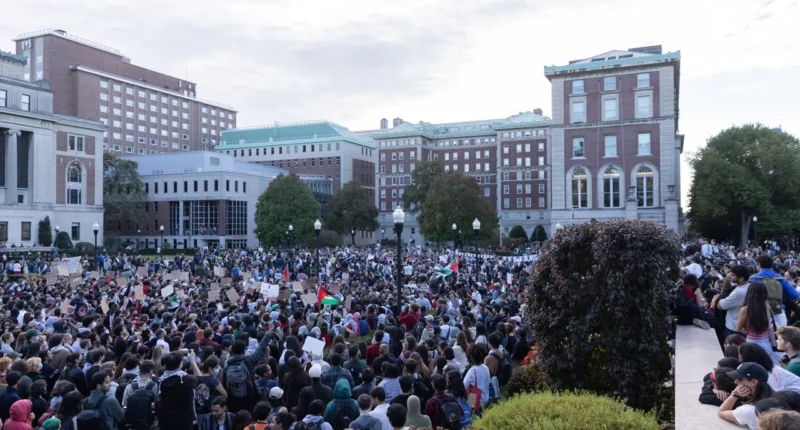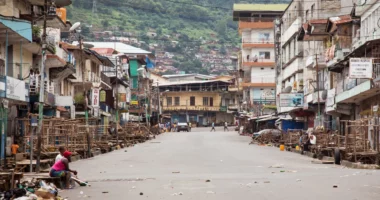Inside the grand gates of Yale University, engraved with the inscription “Enter Here Find Welcome and Wisdom,” 27-year-old doctoral student Emily Thompson expressed the weight of the ongoing Israel-Hamas conflict that has permeated the campus atmosphere.
Thompson, hailing from Canada and pursuing a Ph.D. in Literature, recounted being approached by friends with contrasting viewpoints regarding the conflict, yet she chose not to align herself with any petitions or statements regarding the emotionally charged issue.
“I don’t claim expertise. I refrain from taking sides,” said Thompson, an active member of the university’s international student community. “It’s intricate, and the loss of lives is disheartening. That’s my stance.”
Renowned for robust discussions and activism, American college campuses are witnessing deep divisions caused by the fervent debates surrounding a conflict entrenched in decades of history. While students on opposing sides express feeling unheard and abandoned by the university’s administration, those who opt not to engage in the war’s discussions argue they also experience a similar sense of isolation.
“You can either detach yourself and ignore the discussions or endeavor to comprehend the complexities to take a stance. But it’s profoundly intricate,” remarked Thompson, who recently arrived in New Haven from Canada.
“It’s a choice between apathy and confusion. It’s too overwhelming to grapple with.”
‘I don’t even want to be involved on campus’
Strongly held opinions regarding the protracted conflict have not only led to disciplinary actions against faculty members but have also triggered a vehement backlash against outspoken students. Consequently, many undergraduates and graduates, concluding one of the most tumultuous semesters in recent memory, acknowledge the highly charged environment’s impact on college life, transforming a place of education into one of distrust and unrest.
“I’d rather steer clear of campus engagement,” expressed a second-year Yale Law student, who preferred not to disclose their identity, feeling drained after recent demonstrations both in support of Israel and Palestine on campus. “My focus now is to graduate and leave.”
In a recent November scene, demonstrators congregated on opposite ends of the Beinecke Plaza, the heart of the Yale campus in New Haven. On this day and other occasions during the autumn, the school authorities closed the vast campus grounds to outsiders partly “to ensure safety and maintain a sense of community during planned protests,” according to an official statement.
The phrase “Zone of Harmony,” previously scribbled in chalk above a bench on Cross Campus, the university’s central walkway, had been washed away.
With restricted access to the campus, a university representative guided a reporter, underscoring that the war-related events weren’t university-sanctioned and breached school policies.
On the imposing stone steps leading from the expansive courtyard to the entrance surrounding Sterling Memorial Library, demonstrators echoed “End the violence” in a measured tone.
A Palestinian-American, Samir Al-Masri, delivered a poignant speech recounting his experience in Gaza. Later, leading demonstrators away from a group waving Israeli flags, he emphasized, “We won’t protest under that flag.”
At the summit of the stairs, a senior studying Biology, choosing to be identified solely as Julia, expressed discomfort owing to the heightened tension on campus – a “mental strain.”
Julia acknowledged she didn’t shy away from expressing her opinions but cautioned against ‘taking sides,’ fearing public exposure or harassment, referring to a digital truck displaying the personal details of pro-Palestine students. Julia confided in close acquaintances about her views.
“Peace in ideologies and actual peace are distinct,” she reflected as the protest dispersed.
In October, university president Peter Salovey addressed online privacy breaches, particularly doxxing, in a statement.
“Some students, including those at Yale, have faced instances of doxxing,” Salovey mentioned. “This form of online intrusion, involving the public exposure of personal information, has been utilized by extremists to target individuals and communities. This behavior will not be condoned and should be reported using appropriate university channels. Cases of this nature will be referred to external authorities if necessary.”
Yale established a support group to address issues related to doxxing, harassment, and online security.
The university postponed its significant fundraising event in October amid escalating tensions stemming from the Israel-Hamas conflict on campus.
“At present, we are aware that the campus environment is highly charged, and many express concerns for their safety,” Yale officials stated on October 12.
University leaders released a separate statement condemning “disturbing instances of anti-Semitic and Islamophobic behavior, including intimidation and physical aggression.”
This statement came following an incident where a Yale student supporting Israel was assaulted while posting flyers on campus.
Salovey implored the university community to avoid language that “demonizes, threatens, or stereotypes entire communities,” stressing that such speech, if unlawful or violating university policies, won’t be tolerated.
Outside the Bass Library, two undergraduates of Filipino descent and a male friend – all preferring anonymity – voiced how the war discourse pervades campus discussions despite its indirect impact on their lives. One student lamented the challenging environment for focusing on academics.
During a sit-in at the Graduate School of Arts and Sciences in November, nearly 50 demonstrators accused the university of bias in favor of Israel. One protester held a megaphone, while another played a drum.
The university’s senior executive vice president, Janet Garcia, appeared at one point. After about 20 minutes, she informed the students they were in breach of school policies and faced potential consequences. The students refused to leave.
“Disagreement doesn’t equate to being unheard,” Garcia stated.
One demonstrator filmed individuals entering the building, causing some students heading to class to seek shelter behind the reception desk to avoid being recorded.
Garcia, who leads the committee on campus security, later issued a statement announcing the suspension of Voices for Justice in the Middle East (VJME) and Jewish Action for Peace (JAP) as official student organizations until the end of the semester.
Garcia stated that the groups “persistently flouted University protocols concerning campus activities, culminating in an unsanctioned event (November 9) that transpired despite warnings and included intimidating rhetoric and actions.”
In an Instagram post, the groups labeled the suspension “an assault on free expression.” They accused the university of “selective censorship of pro-Palestinian organizations to stifle opposition against Israel’s escalating aggressions” and “silence our voices.”
Thompson, the Literature doctoral student, mentioned that Americans prioritize avoiding offense over expressing viewpoints. The Israel-Palestine conflict, she observed, complicates interpersonal connections because “every word uttered can be misconstrued and cause offense.”
As the semester draws to a close, Thompson intends to steer clear of protests and focus on her studies at home. She prefers superficial discussions about everyday matters, citing that when political conversations arise, “people get defensive and play the victim.”
“Hence, people refrain from dialogue,” she concluded.





